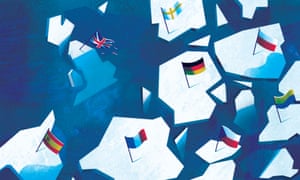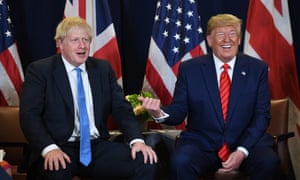Martin Kettle
Wed 6 Nov 2019 17.54 GMT

Illustration: Thomas Pullin
Arguably the most surreal event during the general election campaign is scheduled for the week before polling day. On 3 December, Nato leaders, including Donald Trump and Boris Johnson, will gather at a Buckingham Palace reception. The next day, the Nato chiefs will meet in a luxury – but thankfully non-Trump-owned – hotel outside Watford. It’s the event where the leaders will discuss big subjects including Syria, Afghanistan, Russia and military burden-sharing – and where none of these big subjects is likely to be solved.
In the not so distant past, a leader fighting an election might have seen an international summit they were hosting as a golden opportunity. The grandeur and importance of such a gathering would mean free publicity from the campaign gods, reminding voters that the incumbent is someone who bestrides the world stage, has the ear of powerful allies, and is at ease with the deepest responsibilities of office. As a prime minister milked the occasion, opponents could only grind their teeth in frustration.
But this summit is not like that. It could be more problem than opportunity. It may even prove to be the most disruptive political event of the election. Part of that is because of the always careless self-confidence of Johnson, for whom the Watford summit may be the final gig – or let us hope so – of the briefest prime ministership of the modern era. Most of it, though, will be down to Trump, whose comments about Brexit and Britain could hijack the final week of the campaign and even have explosive effects on the outcome.
Yet the 2019 Nato summit is also a timely signal of something much larger in modern history. This difficult summit will be a microcosm of a wider crisis that stretches across the post-1945 international institutions. This crisis forms the material context of the 12 December election and the policy choices it poses for Britain. Indeed the election itself is also a large symptom of the crisis.
Consider the multiple policy failures that will be discussed at Watford: Syria, in which a Nato member state, Turkey, is currently attacking the allies of the most powerful member, the US; Afghanistan, in which the longest combat mission ever begun by Nato is still no nearer to completion; and Russia, whose threat Nato exists to combat, but whose closeness to Trump may bring him down and whose machinations in British politics mean Johnson is trying to stifle all public discussion of the subject before polling day.
The Nato summit, in other words, is not an opportunity to reassure the voters that all is well and in good hands. It is an event that should more logically compel them to worry about this country’s increasingly uncertain and darkening future and its need for alliances. Thirty years on from the destruction of the Berlin Wall and the end of the cold war, the conceit that Europe was then at the centre of a rules-dominated, liberal global order is no longer valid. The reality today is different. The rules-based order is in decline. And the continent of Europe is no longer at its centre.
It is not just Nato. The United Nations is weaker. So is the Bretton Woods financial settlement. There may never have been an internationalist golden age, but international bodies are struggling as never before in the modern era to exert power and influence in the face of the Trump administration, China and the boldness of repressive states including Russia and Turkey. Only this week in Thailand, the Asean south-east Asian summit – motto “One vision, one identity, one community” – went ahead without the once inescapable involvement of the leaders of the US, China and Russia.
Brexit, the issue at the heart of this UK election, should be seen as another symptom of this wider fragmentation rather than simply as an insular psychodrama for Britain. After all, not only would Brexit subtract significant wealth and power from the EU, it would also destabilise it. As the former MI6 chief John Sawers has argued, EU stability rested for decades on a three-legged stool provided by Germany, France and Britain. Take one leg away and the consequences are obvious.
Brexit has not toppled the EU. Indeed the EU’s response has been to pull together, rather than push further apart. Nevertheless, a decade ago it was the German chancellor, Angela Merkel, who argued that Europe, with its relatively small population in world terms, would have to work exceptionally hard to remain globally competitive and simultaneously maintain the most generous welfare systems in the world. That has not changed. Everything Merkel said then is even more true today, while the surrounding global conditions – including trade wars, increased migration and mounting inequalities – have made it even tougher.
Seen against this backcloth, it is hard to exaggerate the importance of the 2019 election, above all to Britain itself – but also, and to a significant degree, to the rest of Europe. The dream of 1989 may have come and gone. Brexit is one of the many things that mark the death of the more naive versions of that dream. But the fact remains. In a 21st-century world over which Europeans exercise diminishing control, countries in Europe – even peripheral ones, such as Britain – will still be disproportionately dependent on Europe’s shared peace, shared trade, shared values, shared security and a host of other practical links.
This will be a difficult century for Europe, including Britain, Brexit or not. But we will still be better off together than apart. There is no better alternative anywhere else. And the lie that there is one needs to be nailed on 12 December.
• Martin Kettle is a Guardian columnist
https://www.theguardian.com/commentisfree/2019/nov/06/britain-breaking-up-europe-brexit-election
